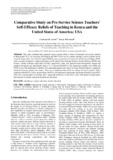| dc.contributor.author | Aurah, Catherine M | |
| dc.date.accessioned | 2019-03-14T12:00:30Z | |
| dc.date.available | 2019-03-14T12:00:30Z | |
| dc.date.issued | 2014 | |
| dc.identifier.uri | http://r-library.mmust.ac.ke/123456789/1269 | |
| dc.description.abstract | This study examined and compared science teacher efficacy beliefs of elementary pre-service teachers
in Kenya and U.S.A. by surveying 168 Kenyan and 189 US Pre-service teachers through a cross-sectional survey
research design. Data were collected using STEBI-B scale, an inventory developed by by Enochs and Riggs (1990),
with a reported Cronbach’s Alpha coefficients as 0.90 and 0.76 for Personal Science Teacher Efficacy (PSTE) and
Science Teacher Outcome Expectancy (STOE), respectively. Data were analysed both descriptively (means and
standard deviations) and inferentially using a 2 x 2 factorial MANOVA. The dependent variables were PSTE and
STOE scores. The independent variables were participant gender and country of origin. Results indicate a significant
interaction between gender and country. There was a significant main effect for country but not for gender. With a
significant MANOVA, follow-up univariate ANOVA tests indicated a statistically significant difference in the PSTE
with USA scoring higher on average and a significant difference in the STOE score with Kenya scoring higher.
Implications for teacher education programs are discussed. | en_US |
| dc.description.sponsorship | American Journal of Educational Research, | en_US |
| dc.language.iso | en | en_US |
| dc.publisher | MMUST | en_US |
| dc.relation.ispartofseries | Vol. 2, No. 4, 233-239; | |
| dc.subject | self-efficacy, science education, teacher education | en_US |
| dc.title | Comparative Study on Pre-Service Science Teachers’ Self-Efficacy Beliefs of Teaching in Kenya and the United States of America; USA | en_US |
| dc.type | Presentation | en_US |

